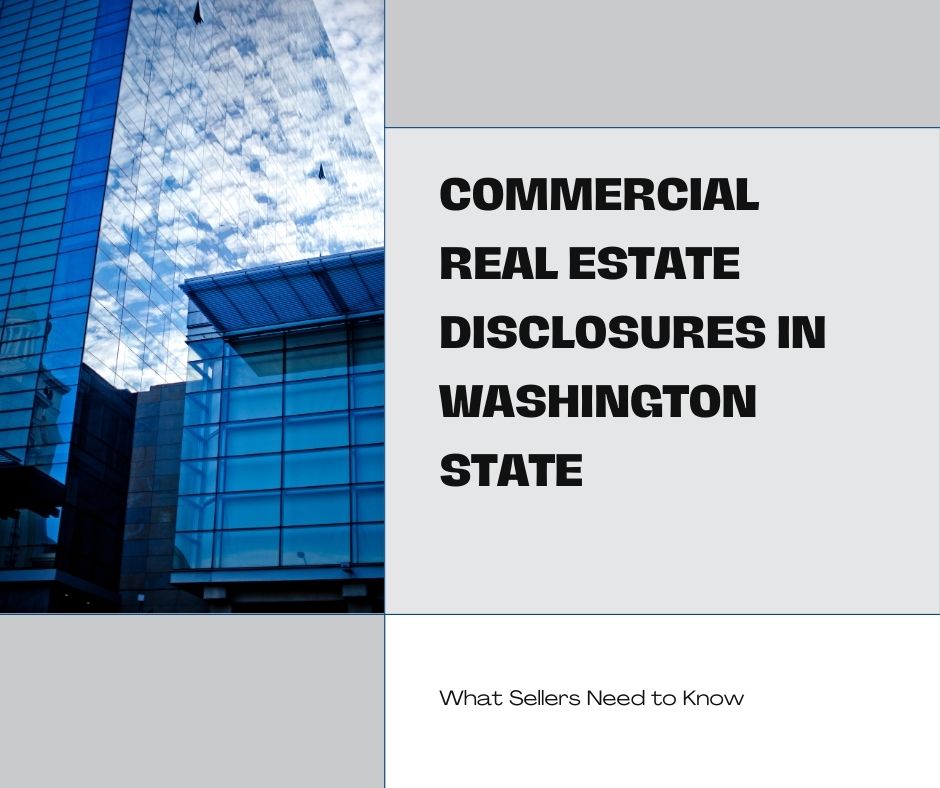Commercial Real Estate Disclosures in Washington: What Sellers Need to Know

Posted on April 7, 2025 by Jacinda Carson
In Washington, sellers of commercial property are required to complete and timely provide a buyer with a seller disclosure statement (commonly known as the Form 17 Comm) containing specific information about the property pursuant to RCW 64.06.013. The seller disclosure statement is required for all transactions with a few exceptions which include, without limitation, foreclosures, transfers between spouses incident to marital dissolution, transfers by a personal representative, and certain gift transfers. A buyer may also waive its right to receive the disclosure statement, except for any of the questions in the “Environmental” section if the answer would be “yes.” Sellers are responsible for disclosing any of the required information that they have knowledge of. This information is intended to help provide buyers with information affecting the subject property. Sometimes the information a seller discloses can be associated with items that are costly to repair or resolve.
Some of the main categories the seller disclosure form covers are title, water, sewer, structural, systems and fixtures, and environmental issues. Common issues concerning title that must be disclosed include the seller’s knowledge of any leases, easements, encroachments, boundary disputes, access limitations, and whether a survey exists. This information can assist buyers in assessing the scope of rights others may have to the subject property, which rights could have significant impacts on a buyer’s plans for the property.
Disclosures may also include broad information about structure(s) and major systems on the property. Common structural issues that are to be disclosed include any roof leaks or floods in the past 5 years and the seller’s knowledge of any settling, slippage, or sliding of the property. There are also provisions for the disclosure of any known defects with major structural components including foundations, doors, windows, walls, ceilings, electrical, plumbing, heating and cooling, fire and security systems and carbon monoxide alarms.
One of the key disclosures in the seller disclosure statement pertains to environmental issues present at the property. If the answer to any of the questions in the “Environmental” section would be yes, then the buyer cannot waive its right to receive the seller’s response to the “Environmental” disclosures. Though the buyer can still waive its right to the remainder of the required disclosures, including the catch-all question regarding any other defects with the property. Information that must be disclosed in this section includes any damage to the property from a fire, wind, flood, or earthquake; the presence of any hazardous substances including asbestos, lead-based paint, chemical storage tanks, use as an illegal dumping site, use as an illegal drug manufacturing site, soil or groundwater contamination, and otherwise.
Agents/brokers should be aware that if they have actual knowledge of any errors, inaccuracies, or omissions in seller disclosure statement, they may be liable to buyers. Thus, sellers of commercial property should fully review the commercial seller disclosure statement to understand the extent of information covered by the seller disclosure statement and to ensure that all required information is accurately and completely disclosed to buyers as may be required.
If you need legal assistance with making disclosures, seeking recourse as a buyer, or anything else related to buying or selling commercial real estate, the Real Estate practice group at Lasher is here to help.
